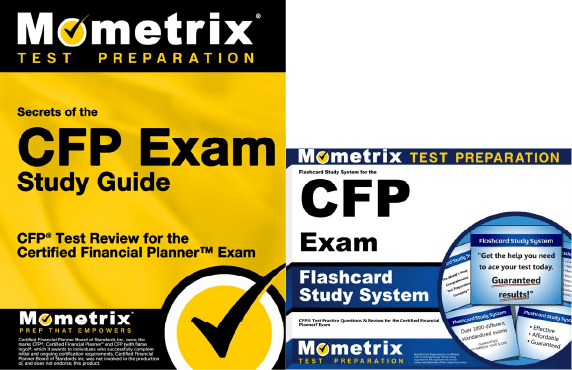If you need help studying for the Certified Financial Planner (CFP) exam or just want some more information about what the test is like, you’ve come to the right place.
Click below to take a free CFP practice test!
Exam Eligibility
Before you can register to take the Certified Financial Planner certification exam, you’ll have to meet ONE of the requirements below:
- You need to complete a CFP Board Registered Program
- You need to complete equivalent coursework
If you meet one of these requirements, you’re set to begin the registration process!
What’s on the Exam?
First, let’s talk about the questions on the exam. There are 170 multiple-choice questions total, and each question will be one of three type
Stand-alone questions are your standard four-option multiple-choice questions, each being around 2-3 sentences long.
Short Scenario Questions
For the scenario questions, you’ll be given a scenario on the left side of the screen and a question on the right side. Each scenario is paired with about 3 questions.
Case Study Questions
The case study questions are essentially the same as the scenario questions—just longer. Each case study typically contains 8-12 questions.
The time limit for the exam is 6 hours. It’s broken into two 3-hour sections, and you have the option to take a 40-minute break between sections.
Let’s take a closer look at the different domains covered on the exam.
1. Professional Conduct and Regulation
8% of the exam
- CFP Board’s Code of Ethics and Standards of Conduct
- CFP Board’s Procedural Rules
- Function, purpose, and general structure of financial institutions
- Financial services regulations and requirements
- Consumer protection laws
- Fiduciary standard and application
2. General Principles of Financial Planning
15% of the exam
- Financial planning process
- Financial statements
- Cash flow management
- Financing strategies and debt management
- Economic concepts
- Time value of money concepts and calculations
- Education needs analysis
- Education savings vehicles
- Education funding
- Gift/income tax strategies
3. Risk Management and Insurance Planning
11% of the exam
- Principles of risk and insurance
- Analysis and evaluation of risk exposures
- Health insurance and health care cost management
- Disability income insurance
- Long-term care insurance and long-term case planning
- Qualified and Non-Qualified Annuities
- Life insurance
- Business owner insurance solutions
- Insurance needs analysis
- Insurance policy and company selection
4. Investment Planning
17% of the exam
- Characteristics, uses and taxation of investment vehicles
- Types of investment risk
- Market cycles
- Quantitative investment concepts and measures of investment returns
- Asset allocation and portfolio diversification
- Bond and stock valuation concepts
- Portfolio development and analysis
- Investment strategies
- Alternative investments and liquidity risk
5. Tax Planning
14% of the exam
- Fundamental and current tax law
- Income tax fundamentals and calculations
- Characteristics and income taxation of business entities
- Income taxation of trusts and estates
- Tax reduction/management techniques
- Tax consequences of property transactions
- Tax implications of special circumstances
- Charitable/philanthropic contributions and deductions
6. Retirement Savings and Income Planning
18% of the exam
- Retirement needs analysis
- Social security and Medicare planning
- Eldercare and special needs planning
- Types of retirement plans
- Qualified plan rules and options
- Non-qualified plan rules and options
- Key factors affecting plan selection for businesses
- Distribution rules and taxation
- Retirement income and distribution strategies
- Business succession planning
7. Estate Planning
10% of the exam
- Property titling and beneficiary designations
- Strategies to transfer property
- Estate and incapacity planning documents
- Gift, estate, and GST tax compliance and calculation
- Sources for estate liquidity
- Types, features, and taxation of trusts
- Marital deduction
- Intra-family and other business transfer techniques
- Postmortem estate planning techniques
- Planning for divorce, unmarried couples and other special circumstances
- Planning for special needs and circumstances
8. Psychology of Financial Planning
7% of the exam
- Client and planner attitudes, values, biases
- Behavioral finance
- Sources of money conflict
- Principles of counseling
- General principles of effective communication
- Crisis events with severe consequences
How to Register
To get started, you’ll need to submit an application to the CFP Board. The application will ask you for your contact information and any documentation to prove your eligibility (among other things).
When you submit the application, you’ll also need to submit the testing fee, which is $925 for standard registration. Late registration raises the fee to $1,025, while early registration lowers the fee to $825.
Exam Scores
The exam is scored using the standard setting method.
This method relies on a group of subject matter experts to evaluate each question on the exam one at a time. The goal is to find a single question that represents the minimum level of knowledge/ability required to be a competent CFP.
The final cut score you need in order to pass isn’t made public, but you should aim to answer at least 75% of the questions correctly.
Retaking the Exam
If you didn’t get a passing score on your first try, that’s okay! You can retake the test during the next testing period.
Keep in mind that you will have to pay the full testing fee every time you retake the test, and you can only take the exam up to five times in your lifetime.
FAQs
How many questions are on the CFP exam?
The exam contains 170 questions.
What is the time limit for the CFP exam?
The exam is timed at 6 hours.
What is the passing score for the CFP exam?
The exact passing score isn’t made public, but you should try to answer at least 75% of the questions correctly.
How much does the CFP exam cost?
The standard registration fee is $925.



 CFP Study Guide
CFP Study Guide CFP Flashcards
CFP Flashcards